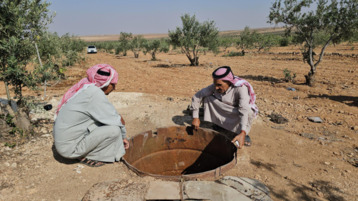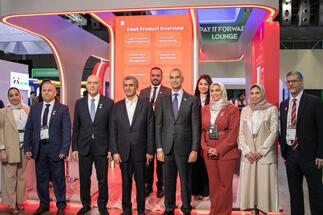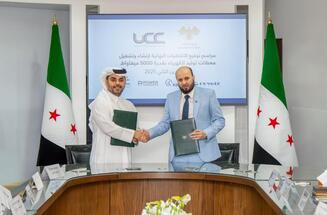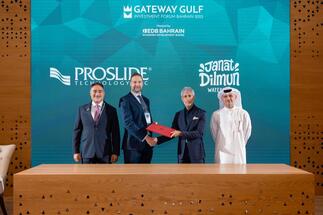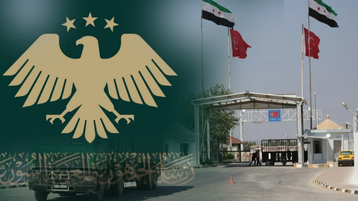-
Land Without Shade
-
Al-Qalamoun Apples and Idlib Olives are Victims of Deforestation and Firewood selling
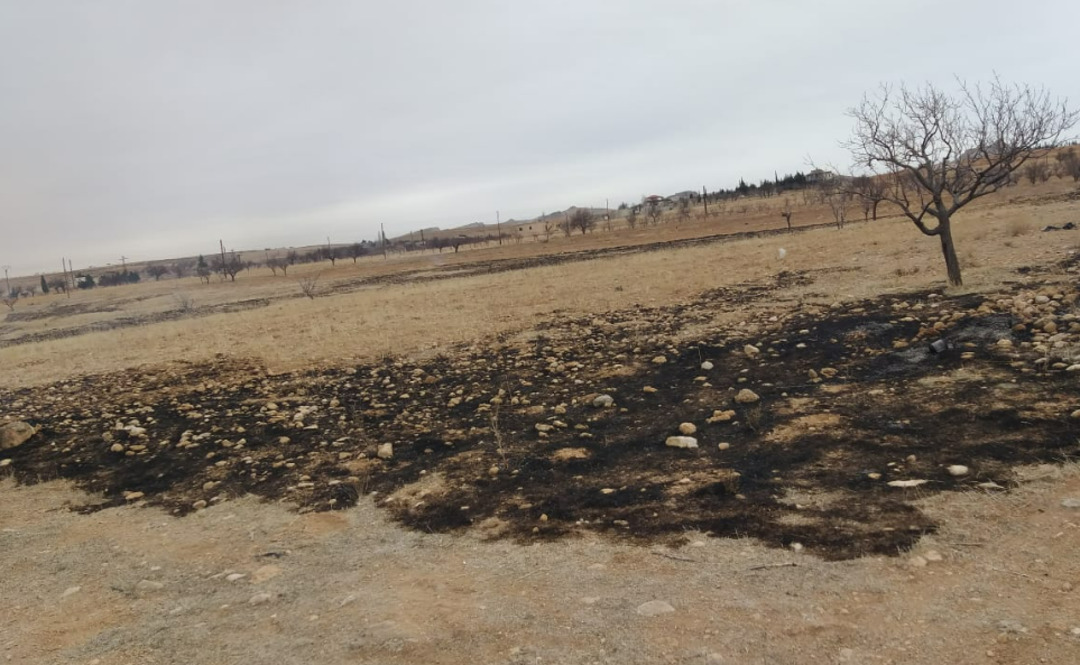
By Munira Baloush - Omaima Mohammed
From a vital agricultural and environmental resource for Syria, it has been reduced to barren land by systematic logging and military looting.
In Rankous Plain of al-Qalamoun of Damascus countryside, farmer Abu Muhammad Khaled (56 years old) stands amidst the ruins of his farm, now reduced to scattered stones and withered trunks. It once boasted hundreds of fruit trees that provided his family with a decent living for decades.
Abu Muhammad owned 25 dunams of land, planted with 700 apple, cherry, pear, apricot, and mulberry trees, alongside two long rows of poplar trees. This wealth, however, did not withstand the war. It was completely cut down by officers and soldiers of al-Assad regime forces stationed at military outposts in Rankous town. There were approximately ten such outposts, and around each one, nearly fifty dunams of trees were bulldozed.
Abu Muhammad's losses was not limited to his land. A large water pump and three submersible pumps were stolen, and the well that irrigated his farm was filled in. His five-room house was blown up after its contents were looted, along with two other houses belonging to his cousins that bordered his land.
The farmer recalls returning in 2016 after a brief displacement to find his land empty and witnessing an officer and three soldiers cutting down trees right in front of him. He says with bitterness, "I couldn't say a word. He and the three soldiers were armed... Speaking the truth to them costs a bullet."
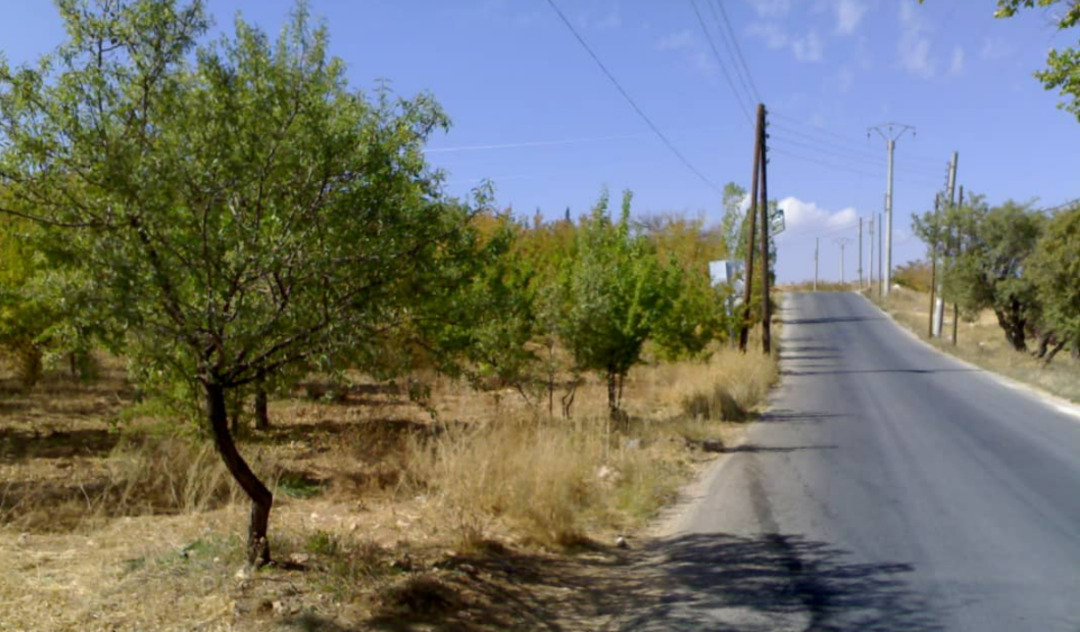
Before the war, his farm yielded approximately $3,500 annually, enough to support his family with dignity. Today, he estimates his losses at over $100,000, including land, house, and agricultural equipment. He emphasizes that rehabilitating the farm will require at least six years of hard work before it can become productive again.
He adds bitterly, "They killed everything in us, they killed our trees, our water, our homes... May God take revenge on them."
A Disaster Affecting Everyone
Abu Muhammad's story is only a reflection of the tragedy experienced by most of the residents of Rankous. His brother lost 27 dunams of land in Arna area after a military checkpoint was erected there in 2014. The checkpoint prevented the family from accessing their land and tending to their trees until they withered completely, before the soldiers stationed there cut them down, adding yet another loss to the family's record.
The disaster wasn't limited to Abu Muhammad's family alone; it extended to the entire Rankous plain, especially al-Qabbada and Rankous plain areas, which were the most affected by the indiscriminate logging that transformed the green orchards into barren land.
Satellite imagery shows a stark contrast in agricultural land between 2012—before the regime seized control of the area—and the period following its fall on December 8, 2014.
Satellite images
During this period, farmers were barred from accessing their land for three consecutive years. Between 2014 and 2017, they were permitted to visit their land only between 6:00 AM and 6:00 PM, but were not allowed to reside permanently in their homes. This resulted in the withering of irrigated trees and increased damage to the fields.
With the continued military control, residents are not only facing the loss of trees, but also their water sources. Hundreds of wells have been filled in after pumps and pipes were stolen, cutting off the groundwater that was the lifeblood of agriculture, according to residents we interviewed.
The green lands have become barren and difficult to reclaim. Drinking water is another crisis burdening the residents, as water no longer reaches homes regularly, forcing them to buy water from tankers at exorbitant prices, with no effective intervention from the responsible authorities.
The Water Risk Atlas classifies Rankous areas as "extremely high" on the water scarcity index.
Atlas photos
Al-Qalamoun: Syria's apple basin that has dried up
Al-Qalamoun areas includes dozens of agricultural villages and towns; like Rankous, Housh Arab, Talfitah, Ain at-Tineh, al-Jubbah, Halaboun, Assal al-Ward, Saydnaya, Maaloula, Yabroud, an-Nabk, and Deir Atiyah are historically renowned for their fertile lands and diverse fruit trees.
Before the war, al-Qalamoun region was known as one of Syria's most important producers of apples, cherries, apricots, and pears.
According to 2010 statistics from the Ministry of Agriculture, Syria had approximately 15 million fruit-bearing apple trees covering nearly 49,000 hectares. Al-Qalamoun region accounted for the largest share, contributing between 20% and 32% of the total apple production, according to a 2011 study by the National Center for Agricultural Policies at the Ministry of Agriculture and Agrarian Reform, published by Enab Baladi.
In 2020, Syria's apple production reached approximately 267,000 tons, concentrated primarily in Homs and the Damascus countryside. Prior to 2014, al-Qalamoun region alone produced over 100,000 tons annually, making it a cornerstone of the local agricultural economy.
However, this landscape was shattered by the war. Orchards were transformed into battlegrounds, vast areas of farmland were bulldozed, and trees were subjected to systematic and indiscriminate felling by regime forces.
According to Wiki Syrian Exporter database, national apple production fluctuated between 267,000 and 476,000 tons annually between 2017 and 2022, with significant variations due to climatic and political conditions.
Despite the war and economic collapse, Syria maintained a presence in international markets, exporting approximately 53,947 tons of apples in 2023, valued at nearly $16.6 million.
According to the Food and Agriculture Organization (FAO) rankings, Syria ranked 37th globally in 2021 and 34th in 2022. It also ranked fourth among Arab countries in apple production, after Egypt, Morocco, and Algeria.
As for cherries, the Damascus countryside also holds a prominent position, accounting for approximately 70% of the total cultivated area and number of trees, and producing about 55% of the national crop, followed by Idlib Governorate with 27%.
Official statistics recorded that annual cherry production ranged between 42,000 and 71,000 tons between 2017 and 2022, cultivated on a total area of 20,963 hectares containing more than six million fruit-bearing trees.
Despite the widespread destruction of agriculture in al-Qalamoun region, cherry exports continued. In 2023, Syria exported approximately 12,321 tons, valued at around five million dollars.
However, behind these figures lies a stark paradox: national production fluctuates, while the towns of al-Qalamoun, once major production areas, are declining. Residents have lost the majority of their orchards due to systematic tree felling, resulting in the disappearance of thousands of tons from the local market and leaving behind significant losses that are not reflected in official figures alone.
Agricultural and Environmental Loss
The investigation team obtained statistics from the Ministry of Agriculture detailing the damage in Rankous. The number of documented farmers who obtained permits to uproot trees reached 224, due to the trees' desiccation. Additionally, several others uprooted their damaged trees without consulting the Rankous Agriculture Department at the time.
The Agriculture Department in at-Tall area of rural Damascus confirmed that the number of trees damaged in Rankous reached approximately 60,000 of various species. The department indicated that this data—at the time of reporting—was approximate, based on the information available to them, as the relevant authorities had not requested a precise assessment of the damage in Rankous plain.
Rankous Agriculture Division estimated the damage to the town's agricultural sector at between 65% and 75%. Residents not only lost their livelihoods, but the area also lost a portion of its vegetation cover, which protected against desertification and helped maintain the local climate balance. This was seen as a form of reprisal by the Assad regime against the town's residents, beginning with the siege of the town and preventing farmers from accessing their lands, followed by the systematic destruction of agricultural lands through logging, filling in wells, stealing irrigation equipment such as pumps and generators, damaging infrastructure, and demolishing poultry farms and stealing their contents.
Abdullah Mahmoud, 41, from Rankous, returned after being displaced to find his land turned into a barren desert. He says, "There are no apples this season. We were waiting for the harvest to buy heating oil and pay off debts. Today, all that's left is loss."
Khaled Baloush, a farmer in his sixties who remained in the town under regime rule, recounts witnessing members of the Third Division cutting down the trees on his farm and selling them as firewood. He says, "The fear of arrest prevented us from even objecting. We saw the fruits of years of labor stolen right before our eyes."
Eyewitness Imad, also from Rankous, describes how soldiers cut down the trees and loaded them onto trucks to sell as firewood at prices reaching $150 per ton. He adds, "People were forced to buy firewood from their own orchards at the market, driven by necessity."
According to the farmers we interviewed, military checkpoints also imposed exorbitant tolls on every truckload of firewood, reaching up to half a million Syrian pounds. Thus, farmers found themselves caught between losing their land and having to buy back what had been cut down at exorbitant prices.
The crisis has worsened over the years. While firewood prices previously ranged between $150 and $250 per ton, last year they ranged between four and six million Syrian pounds (between $350 and $500). A single family needs at least one and a half to two tons to get through the harsh winter. As for diesel fuel, the price per liter on the black market reached between 15,000 and 20,000 Syrian pounds (more than $1.50), making it an expensive alternative heating method.
The Rural Damascus Agriculture Directorate confirms that thousands of trees have been damaged by systematic logging and felling, as well as the withering of traffic trees due to a lack of irrigation and maintenance, ordered directly by regime officers. Consequently, the directorate has received 224 permits to uproot dead trees belonging to local residents, indicating significant losses in the fields.
According to statistics from the Ministry of Agriculture that we obtained, the town of Rankous has approximately 38,422 trees, distributed across several varieties. Apple trees top the list with 23,216 trees covering an area of approximately 928.64 dunams, followed by cherry trees with 7,890 trees planted on 263 dunams, then apricot trees with 4,774 trees covering approximately 159.1 dunams, and pear trees with 2,245 trees spread over 89.8 dunams. Almond trees number 193 trees on 7.72 dunams, while peach trees number only 94 trees planted on 3.76 dunams, and plum trees are just nine trees spread over 0.36 dunams. Thus, the total area planted with fruit trees in the town is approximately 1,452 dunams.
Lawyer Nour Awais points out that Forestry Law No. 6 of 2018 imposes penalties on those who cut down trees, ranging from imprisonment to fines. However, the reality on the ground in Qalamoun reveals the complete absence of any enforcement of the law, with logging becoming a systematic policy carried out under the auspices of regime forces.
Today, the residents of Qalamoun face a tragic reality: their once-green land now yields only drought, and their agricultural losses have transformed into an environmental and economic catastrophe threatening their present and future.
The Lost Olive Trees
The situation is no different for Abu Issam, a farmer in his sixties from the town of Maaret Harma in the southern Idlib countryside. Leaning against the cracked wall of his house, Abu Issam drifts into thought before a deep sigh breaks his silence: "Out of 800 olive and fig trees, I only have 20 left. We used to harvest four tons of olive oil and two tons of dried figs from them every season… all of that has vanished in less than six years."
Abu Issam's story is not unique. Dozens of families in southern Idlib lost their orchards, some spanning generations, after farmland was transformed into a scene of logging, burning, and bulldozing. This was one of the most widespread and systematic campaigns of destruction targeting the fruit trees that form the backbone of the region's economy and agricultural culture.
The man was forcibly displaced along with the residents of his village in 2019 following a regime military campaign that seized control of the Idlib countryside. After the regime's fall, he returned to his village only to find the ruins of houses stripped of their ironwork and roofs, and fields devoid of olive and fig trees.
The shock wasn't limited to the devastating material losses; it also permeated the farmers' spirits. Abu Issam developed a chronic heart condition after his hopes of returning to his land and working it were shattered.
Abu Muhammad, a 45-year-old neighbor from the village of Sahyan, south of Maaret an-Numan, hasn't forgotten the faces of the young men who uprooted his pistachio trees, demolished his large house, and stripped it of everything they could—iron, doors, windows, and tiles—to this day, "to no avail," even though he has official documents listing the names of the gangs responsible for demolishing houses and cutting down trees in the Idlib countryside.
A year after the regime entered the village of Sahyan, following its forces' incursion into the area, Abu Muhammad returned to check on his house and land.
He says, "At the end of 2022, I returned with my father to check on my house after Khan Sheikhoun and some of the surrounding villages became a civilian zone accessible to civilians. I found no trees left on my farm. My uncle's fields were also completely uprooted. We lost about 300 olive trees, some between 40 and 50 years old, and I found my house completely looted."
Abu Muhammad recounts the incidents of tree cutting on his land: "I saw them with my own eyes cutting down the trees with chainsaws. I just filmed them." He later learned that they belonged to the Air Force Intelligence's 25th Division, commanded by Suheil al-Hassan, one of the most prominent figures in the Assad regime.
Olive, fig, and pistachio crops are among the most important agricultural products upon which the region's inhabitants depend. Olive oil is particularly prized for its high quality and flavor, surpassing oils from other countries and regions.
Satellite imagery reveals a significant decline in vegetation cover in the agricultural lands of southern Idlib countryside following the Assad regime's control of the area between 2019 and 2024.
Satellite images
During this period, regime forces engaged in widespread looting, destruction of infrastructure, and the deliberate removal of iron from the roofs of civilian homes. Not content with that, they continued to cut down, uproot, and burn trees, according to field observations and accounts from farmers who gradually returned to their lands after the battle to repel the aggression on December 8, 2024.
Data from the Syrian Ministry of Agriculture for 2017–2018 indicates that Idlib Governorate, before the war, contained one of the largest agricultural areas in Syria. Olive groves covered approximately 128,000 hectares, containing more than 13 million trees, with an annual production of up to 75,000 tons.
The region was also known for its fig production, covering nearly 3,800 hectares and containing approximately 882,000 trees, with an annual production capacity of up to 17,500 tons. In addition, pistachio cultivation occupied approximately 10,500 hectares (13% of Syria's total production), encompassing around 1.6 million trees and producing 16,500 tons annually.
But this agricultural wealth has suffered widespread destruction. According to the Idlib Agriculture Directorate, between 80 and 90 percent of olive trees were cut down in the towns of Kafranbel, Maaret Harma, Basqala, Jabal, Hass, and others. Fig orchards were left to languish under neglect and disease, with large sections of them withering away. Pistachio trees were also affected by fires and uprooting in several towns, particularly in and around Maaret al-Numan.
In Kafranbel region alone, which has a total area of approximately 22,900 hectares, the land planted with fruit trees before the recent campaign reached 13,000 hectares, mostly olives, along with figs, grapes, and pistachios. However, the military campaign and the accompanying uprooting and systematic cutting have transformed vast areas into barren wastelands.
Syria is the seventh largest producer of olive oil in the world, with statistics indicating the presence of 108 million olive trees. The average annual production is approximately one million tons of olives, and their extraction produces 175,000 tons of olive oil annually, according to the statistics of the International Olive Council in Madrid for 2015.
The same statistics indicate that there are 38 million olive trees in the Idlib and Aleppo governorates—representing 35.2% of the total number of olive trees in Syria—which produced 500,000 tons of olives, or about 50% of the national production, and 90,000 tons of olive oil, representing 51.4% of the national production.
Olives are among the most important rainfed crops in Syria, with the country ranking fourth in the Arab world and seventh globally in olive production. The cultivated area is estimated at approximately 650,000 hectares, encompassing more than 90 million trees, 72 million of which are fruit-bearing. The average annual production reaches 1.2 million tons of olives, yielding about 150,000 tons of olive oil and 300,000 tons of table olives, according to Wiki Syrian Exporter database.
Idlib and Aleppo governorates alone account for half of the cultivated area and production, while Latakia and Tartus account for approximately 20%. Aleppo recorded the highest number of olive trees, with approximately 23 million.
Production data, according to Wiki Syrian Exporter database, shows significant fluctuations in recent years. The harvest reached approximately 665,000 tons in 2018, rising to 884,000 tons in 2019, before declining to 566,000 tons in 2021. It then experienced a significant jump to 991,000 tons in 2022.
Idlib alone boasts nearly 13 million olive trees across an area of approximately 128,000 hectares, with an estimated annual production of 75,000 tons, making it one of the most important olive-growing regions in the country. Despite this, Syrian olive exports did not exceed 65 tons in 2021, rising to 312 tons in 2022, before declining again to 102 tons in 2023. This reflects the gap between the large production volume and the weak presence in global markets.
Drought Exhausts Farmers
Farmers in rural Idlib are trying to compensate for the losses their farms suffered during years of neglect by tending to the few remaining saplings that escaped logging or uprooting.
Intensifying irrigation was one of the methods farmers relied on during this year's drought. They brought water in tankers, each costing around 300 Turkish lira (approximately $7), and irrigated the trees by digging holes around them in a circular pattern.
Idlib's Director of Agriculture, Mustafa Muwahid, told SANA that olive production is estimated at no more than 55,000 tons. This figure reflects the poor harvest this season, as olive trees suffered severe water stress during the flowering period, preventing them from setting fruit. He emphasized that the olive oil produced in Idlib is classified as extra virgin olive oil due to the locals' reliance on natural fertilizers.
Illegal Logging
Wassim al-Najm, a resident of the western outskirts of Khan Sheikhoun, says he returned to his city with his family in 2022 after years of displacement. He owns a grain sieve. He recounts that throughout the regime's control of the southern Idlib countryside, the area stretching from Maar Zita village in the north to Maarat an-Numan was a closed military zone, completely off-limits to civilians. Security checkpoints were in place, and the area was under the administration of the Ministry of Defense.
He adds, "Civilians didn't cut down the trees; the army was responsible for the logging. There were private workshops that came to cut down and uproot trees in areas far from public view. In Khan Sheikhoun, for example, some families returned a few years before the regime's fall to harvest their crops, but the logging began when the army stormed the area, and after some families returned. It's done systematically under the protection of the security services."
Abu Ahmad points out that control of the land was divided among regime leaders, and one of the most prominent figures known in the area at that time was a man called "Abu Asad," who exerted his influence over the villages of rural Idlib. He confirms that logging operations were carried out in direct coordination with the Fourth Division, with gangs cutting down trees at night under their protection and selling the wood on the black market in the villages of rural Hama.
He recalls an incident he witnessed firsthand: "One night, a blue truck loaded with firewood passed near Gharbali. The police stopped it, and after asking an acquaintance in the police force, I learned it was coming from Suran. But in the end, nothing happened, because any police intervention would end with the Fourth Division seizing the confiscated goods and burying the matter."
He continues: “Once again, while returning from a plot of land in the village of Sheikh Mustafa at sunset, I heard the sounds of chainsaws cutting firewood in fields near Kafr Sijneh. I reported it to the police, and they did send a patrol. But a few days later, one of the officers told me that the Fourth Division had come and taken the woodcutters and the firewood directly. He told me, ‘Brother, they’re all with Maher al-Assad, and there’s nothing we can do.’”
According to his testimony, civilians were forbidden from cutting down trees or selling firewood. The entire harvest was transported to the major cities and also sold on the black market in the Hama countryside, specifically in the towns of Qamhana, Maardes, and Suran, where a kilogram of firewood could fetch up to 2,000 Syrian pounds, equivalent to about one and a half dollars.
Abu Ishaq recounts that his relative once cut down a tree in his vineyard, was arrested, and fined 40 million Syrian pounds. He wasn’t released from prison until the liberation of Hama prison and the fall of the regime.
Abu Ishaq, al-Najm, and others agree that entering the military zone for the purpose of Looting homes or cutting down trees was impossible for anyone without the support of regime leaders.
The investigation team tried to contact several firewood merchants in Hama and the Syrian coast, but they were unwilling to provide any information about the firewood they received during the period covered by the investigation.
The Heating Crisis in Syria
A shortage of heating materials began to emerge with the outbreak of the Syrian war and worsened further when the oil-rich northeastern regions of Syria fell out of the regime's control. This forced residents to use alternatives to diesel fuel for heating, such as various types of firewood, almond shells, old clothes, or coal. The price of a ton of firewood ranges between $200 and $300, depending on market availability and quality.
In a small room on a mountainside near the town of Khirbet al-Jouz, Umm Asil, a resident of the town, arranges the firewood her husband has collected to store for the winter. She describes the area as high and cold, and her family has traditionally used firewood for heating every winter. Since the beginning of the Syrian war, heating materials have become scarce and their prices have skyrocketed.
Um Asil's family consumes about four tons of firewood of various types, which is abundant in Jabal al-Turkman. Some civilians from nearby villages collect firewood year-round due to their limited purchasing power. The price of one ton of firewood in this specific area ranges between $100 and $200, increasing with distance from the coastal mountains.
Abu Asil travels to Jabal al-Akrad and Jabal al-Turkman to collect whatever dry firewood he can find to secure his winter provisions. For the past three months, collecting firewood has become a difficult and dangerous task after the government banned logging. A fine of one dollar per kilogram of firewood is imposed, and anyone caught collecting firewood from the mountains faces three months in prison.
Although this decision aims to preserve what remains of the fruit trees and protect Syrian crops, anxiety is gripping the residents who are accustomed to using firewood for heating, especially with the approach of winter.
This investigative report was prepared by the journalist as part of a project implemented by the Syrian Center for Media and Freedom of Expression, with the support of NED and under the supervision of Mr.
You May Also Like
Popular Posts
Caricature
opinion
Report
ads
Newsletter
Subscribe to our mailing list to get the new updates!


